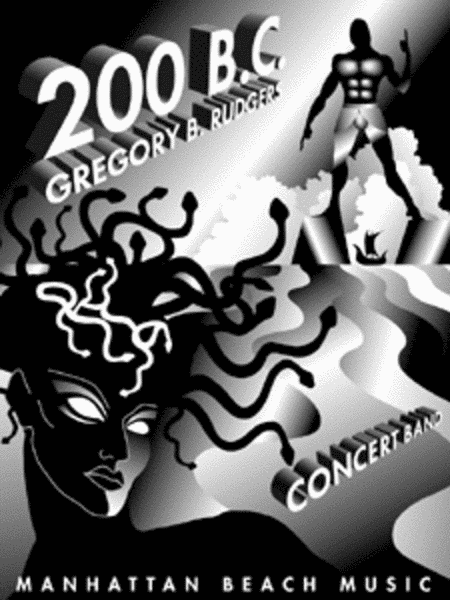200 B.C.
-
Ships in 4 to 6 weeks
Details
Description
SKU: MH.0-931329-53-1
Composed by Gregory B.Rudgers. Suitable for high school, community, and college bands. Conductor score and set of parts. Duration 7:30. Published by Manhattan Beach Music (MH.0-931329-53-1).ISBN 9780931329531.
Journey back to ancient Greece and view a place of long-gone legend. Follow the trail to the Kingdom of Ithaca, from the heroic palace, to a place of tranquility, to a reckless dance of abandon, to the return of Odysseus. The melodic material used in 200 B.C. is from a two thousand year old Greek hymn to Apollo. The legendary adventures of Odysseus as described by Homer in the Odyssey (ca. 700 B.C.) provide the programmatic material. The music is freely based upon the First Delphic Hymn (or Paen to Apollo), composed ca. 200 B.C. The source is a transcription appearing on pages 363 - 367 of Ancient and Oriental Music, Edited by Egon Wellesz (Oxford University Press: London, 1957). Each movement of the work depicts a key event in the epic Homeric poem, as described below. Movement I: Intrada - The first four notes of this movement, C - Bb - G - Bb, are the melodic and harmonic foundation for the entire work. These pitches, introduced in a simple and direct manner, are subsequently developed in more complex fashions throughout the suite. Following this stately introduction is a militaristic fanfare that introduces the dotted-eighth and sixteenth-note figure later reprised in the second and fourth movements. Indeed, all the musical ideas which will be central to the remaining movements first appear in the Intrada. This movement depicts the grandeur of Odysseus and his kingdom in Ithaca, and establishes the heroic mood of the entire work. Movement II: Ballad - After a brief restatement of the opening dotted-eighth-and-sixteenth fanfare, the second movement extracts the falling third (Bb to G) from the C - Bb - G - Bb motif and extends it and expands it into a haunting solo for alto saxophone. The C - Bb - G - Bb motif appears again (see measures 23 - 33 in trumpets) as counterpoint to this melody, now pulsing through the thick texture of the band. Many performers have come to view the Ballad as the emotional epicenter of the entire suite; my conception of the Ballad is to achieve a union of pathos and strength. Programmatically, this movement depicts Odysseus's son, Telemachos, as he both longs for Odysseus's return and stoically defends his father's kingdom. Movement III: Dance - It will take Odysseus twenty years to return to Ithaca. During his absence, noblemen besiege his palace, violating the sanctity of the household and seeking the hand of his wife, Penelope. This movement depicts the wanton revelries that result. The original four-note motif is chromatically altered and the meter is made irregular. The rapid tempo, driving percussion, and angular meter and melodies combine in an explosion of reckless abandon. Movement IV: March Building from a delicate woodwind ensemble accompanied by finger cymbals to a fully orchestrated statement replete with thundering percussion, this is a resounding march of victory. Odysseus has returned in triumph to restore dignity to his household and to reclaim the throne of the Kingdom of Ithaca. Ensemble instrumentation: 1 Piccolo, 8 Flute 1 - 2, 2 Oboe 1 - 2, 4 Bb Clarinet 1, 4 Bb Clarinet 2, 4 Bb Clarinet 3, 1 Eb Alto Clarinet, 3 Bb Bass Clarinet, 2 Bassoon 1 - 2, 3 Eb Alto Saxophone 1, 3 Eb Alto Saxophone 2, 2 Bb Tenor Saxophone, 1 Eb Baritone Saxophone, 3 Bb Trumpet 1, 3 Bb Trumpet 2, 3 Bb Trumpet 3, 2 F Horn 1-2, 2 F Horn 3-4, 2 Trombone 1, 2 Trombone 2, 2 Trombone 3, 3 Euphonium (B.C.), 2 Euphonium T.C., 4 Tuba, 1 Timpani, 2 Mallet Percussion: Bells, Xylophone, 2 Percussion 1: Snare Drum, Tambourine, 2 Percussion 2: Crash Cymbals, Suspended Cymbal, Tom-Tom, Finger Cymbals, 1 Percussion 3: Bass Drum.

 Share
Share